外研版必修三module4重点知识与练习
- 格式:doc
- 大小:77.50 KB
- 文档页数:7
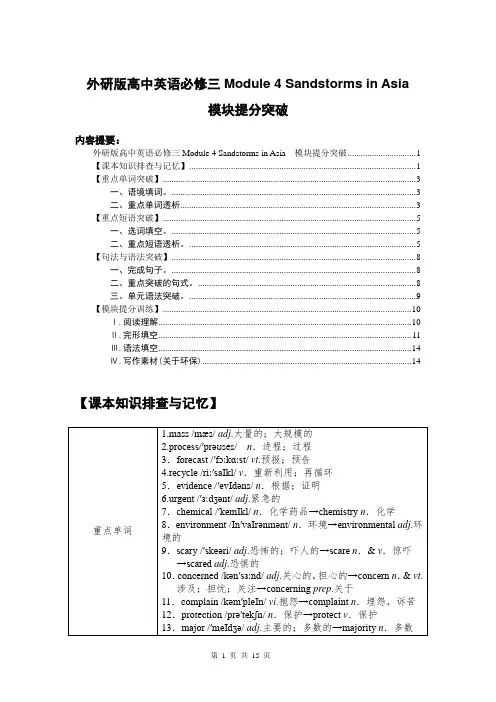
外研版高中英语必修三Module 4 Sandstorms in Asia模块提分突破内容提要:外研版高中英语必修三Module 4 Sandstorms in Asia 模块提分突破 (1)【课本知识排查与记忆】 (1)【重点单词突破】 (3)一、语境填词。
(3)二、重点单词透析 (3)【重点短语突破】 (5)一、选词填空。
(5)二、重点短语透析。
(5)【句法与语法突破】 (8)一、完成句子。
(8)二、重点突破的句式。
(8)三、单元语法突破。
(9)【模块提分训练】 (10)Ⅰ.阅读理解 (10)Ⅱ.完形填空 (11)Ⅲ.语法填空 (14)Ⅳ.写作素材(关于环保) (14)【课本知识排查与记忆】【重点单词突破】一、语境填词。
1.Concerning your health,we’re very concerned about your illness though you always say there’s no cause for concern.(concern)2.An unhappy home environment can affect a child’s behaviour,so we should pay attention to environmental problems.(environment)3.The manager had to put his work aside for a while to deal with an urgent accident. 4.Do you listen to the weather forecast from the local radio station every morning? 5.I was moving some furniture and I twisted my ankle in the process.6.A good government will grant freedom of speech to its citizens and will not control their opinions and thoughts.7.We are planning an advertising campaign(活动) for our new product.8.As I just mentioned,pollution is a major(主要的) concern of our country. 9.Anything you say may be taken down and used as evidence(证据) against you. 10.It is very unwise to take legal action against someone unless it is absolutely(绝对地) necessary.二、重点单词透析1mass n.团,块,堆;大量,许多Her garden is a mass of flowers.她的花园里种满了花。
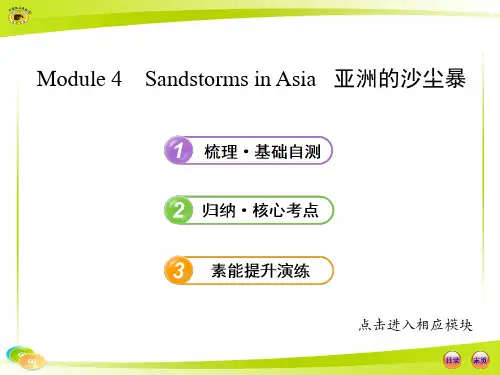
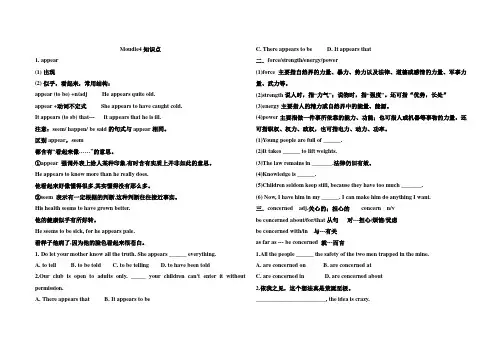
Moudle4知识点1.appear(1)出现(2)似乎,看起来,常用结构:appear (to be) +n/adj He appears quite old.appear +动词不定式She appears to have caught cold.It appears (to sb) that--- It appears that he is ill.注意:seem/ happen/ be said的句式与appear相同。
区别appear,seem都含有“看起来像……”的意思。
①appear 强调外表上给人某种印象,有时含有实质上并非如此的意思。
He appears to know more than he really does.他看起来好像懂得很多,其实懂得没有那么多。
②seem 表示有一定根据的判断,这种判断往往接近事实。
His health seems to have grown better.他的健康似乎有所好转。
He seems to be sick, for he appears pale.看样子他病了,因为他的脸色看起来很苍白。
1.Do let your mother know all the truth. She appears ______ everything.A.to tellB. to be toldC. to be tellingD. to have been told2.Our club is open to adults only. _____ your children can't enter it without permission.A.There appears thatB. It appears to beC. There appears to beD. It appears that二.force/strength/energy/power(1)force主要指自然界的力量、暴力、势力以及法律、道德或感情的力量、军事力量、武力等。
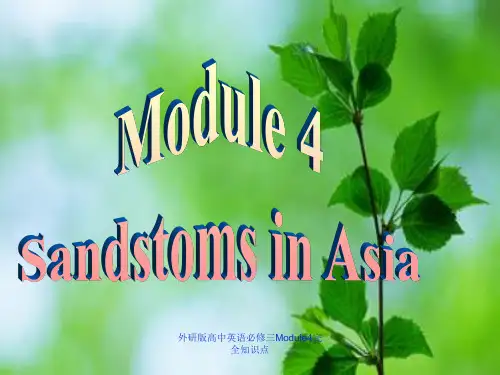
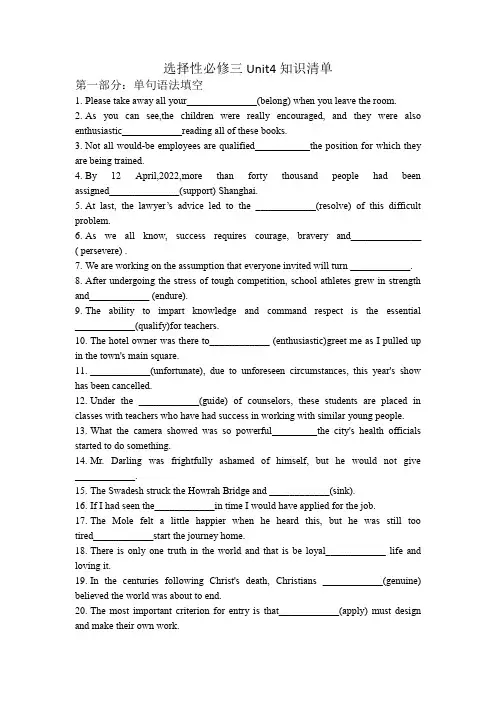
选择性必修三Unit4知识清单第一部分:单句语法填空1.Please take away all your______________(belong) when you leave the room.2.As you can see,the children were really encouraged, and they were also enthusiastic____________reading all of these books.3.Not all would-be employees are qualified___________the position for which they are being trained.4.By 12 April,2022,more than forty thousand people had been assigned______________(support) Shanghai.5.At last, the lawyer’s advice led to the ____________(resolve) of this difficult problem.6.As we all know, success requires courage, bravery and______________ ( persevere) .7.We are working on the assumption that everyone invited will turn____________.8.After undergoing the stress of tough competition, school athletes grew in strength and____________(endure).9.The ability to impart knowledge and command respect is the essential ____________(qualify)for teachers.10.The hotel owner was there to____________ (enthusiastic)greet me as I pulled up in the town's main square.11.____________(unfortunate), due to unforeseen circumstances, this year's show has been cancelled.12.Under the ____________(guide) of counselors, these students are placed in classes with teachers who have had success in working with similar young people. 13.What the camera showed was so powerful_________the city's health officials started to do something.14.Mr. Darling was frightfully ashamed of himself, but he would not give ____________.15.The Swadesh struck the Howrah Bridge and ____________(sink).16.If I had seen the____________in time I would have applied for the job.17.The Mole felt a little happier when he heard this, but he was still too tired____________start the journey home.18.There is only one truth in the world and that is be loyal____________ life and loving it.19.In the centuries following Christ's death, Christians____________(genuine) believed the world was about to end.20.The most important criterion for entry is that____________(apply) must design and make their own work.21.We have always firmly believe that" quality is life", will be regarded as the quality of the fundamental, service throughout, your home, your project as our mission, is ____________ (commit)to doing a good job!22.A shared bike is left ____________ (abandon)at a bus stop.23.While the two are only days apart in age they seem to belong____________wholly different generations.24.During autumn, the leaves change color and fall____________from the trees.25.Once you purchase a home, no doubt you're going to want to ____________ (furniture)and decorate it.26.She closed her eyes tightly in a vain attempt to hold____________the tears.27.The ____________(adversity) effect of excess alcohol is beyond question.28.You must complete three written _______________ (assign).29.Anger and____________ (bitter) covered upon me for weeks.30.It is________________ (rough) estimated that the loss caused by the accident reached 300 million yuan.31.He shook his head ____________(miserable), tears pouring down his cheeks.32.Her face was full of gloom and____________(cruel).33.He is outgoing in character and a man with a real spirit of ____________(commit)to almost everything.34.From then on,I committed____________(I)to lose weight and getting into shape.35.If you want to catch that train we'd better set off ____________the station immediately.36.I____________(wait) for my girl friend for half an hour, but she has not shown up yet.第二部分:语法填空A unique exhibition of paintings opened at the Shanghai Mental Health Center on Thursday—all the 49 paintings are created by three hospitalized artists with schizophrenia (精神分裂).With the theme of “loud hailer”, the exhibition offers people with the mental disorder a chance to express themselves artistically and allows their voice ______1______(hear) by the public, officials from the center said. This can arouse ______2______(aware) and promote better understanding and support for people with mental diseases, they added.“Loud hailer means two-way communication. These paintings are created by patients _____3_____have been hospitalized for a long time. They live in a ______4______(relative) closed environment. So we want to use this exhibition to achieve communication between these hospitalized artists ____5____the audience,”said Chen Mengyuan, the curator.Dr Xie Bin from the Shanghai Mental Health Center said the exhibition also aims to remove the stigma (污名) attached______6______ people with schizophrenia.“We hope more people with mental disease will become _______7_______(scholar), artists and even great scientists like John Nash through medical treatment and a good ______8______(society) environment.”Nash was an American mathematician who ________9________(award) the 1994 Nobel Prize for Economics and whose life as _______10_______schizophrenia patient was described in the movie A Beautiful Mind, based on his book of the same name.。
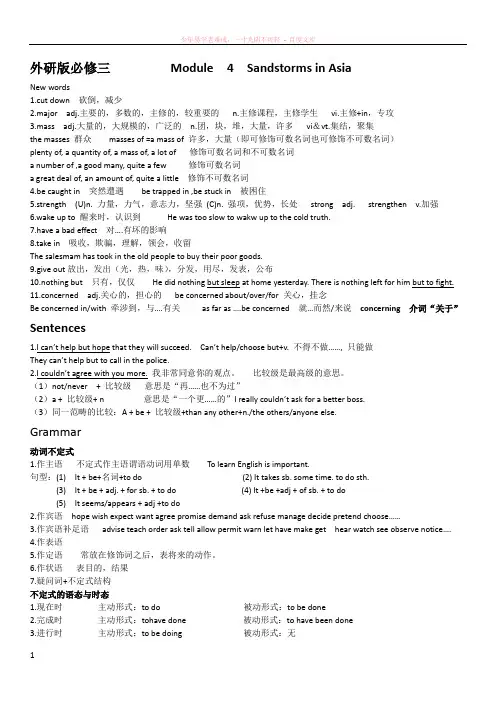
外研版必修三Module 4 Sandstorms in AsiaNew words1.cut down 砍倒,减少2.major adj.主要的,多数的,主修的,较重要的n.主修课程,主修学生vi.主修+in,专攻3.mass adj.大量的,大规模的,广泛的n.团,块,堆,大量,许多vi&vt.集结,聚集the masses 群众masses of =a mass of 许多,大量(即可修饰可数名词也可修饰不可数名词)plenty of, a quantity of, a mass of, a lot of 修饰可数名词和不可数名词a number of ,a good many, quite a few 修饰可数名词a great deal of, an amount of, quite a little 修饰不可数名词4.be caught in 突然遭遇be trapped in ,be stuck in 被困住5.strength (U)n. 力量,力气,意志力,坚强(C)n. 强项,优势,长处strong adj. strengthen v.加强6.wake up to 醒来时,认识到He was too slow to wakw up to the cold truth.7.have a bad effect 对….有坏的影响8.take in 吸收,欺骗,理解,领会,收留The salesmam has took in the old people to buy their poor goods.9.give out放出,发出(光,热,味),分发,用尽,发表,公布10.nothing but 只有,仅仅He did nothing but sleep at home yesterday. There is nothing left for him but to fight.11.concerned adj.关心的,担心的be concerned about/over/for 关心,挂念Be concerned in/with 牵涉到,与….有关as far as ….be concerned 就…而然/来说concerning 介词“关于”Sentences1.I can’t help but hope that they will succeed. Can’t help/choose but+v. 不得不做……, 只能做They can’t help but to call in the police.2.I couldn’t agree with you more. 我非常同意你的观点。
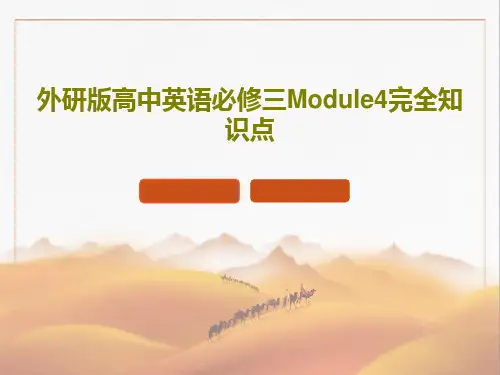
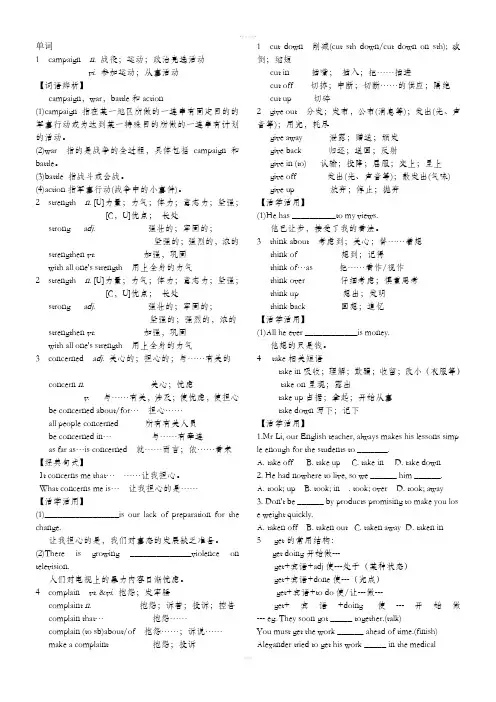
单词1 campaign n. 战役;运动;政治竞选活动vi. 参加运动;从事活动【词语辨析】campaign,war,battle和action(1)campaign 指在某一地区所做的一连串有固定目的的军事行动或为达到某一特殊目的所做的一连串有计划的活动。
(2)war 指的是战争的全过程,具体包括campaign和battle。
(3)battle 指战斗或会战。
(4)action指军事行动(战争中的小事件)。
2 strength n. [U]力量;力气;体力;意志力;坚强;[C,U]优点;长处strong adj. 强壮的;牢固的;坚强的;强烈的,浓的strengthen vt. 加强,巩固with all one's strength 用上全身的力气2 strength n. [U]力量;力气;体力;意志力;坚强;[C,U]优点;长处strong adj. 强壮的;牢固的;坚强的;强烈的,浓的strengthen vt. 加强,巩固with all one's strength 用上全身的力气3 concerned adj. 关心的;担心的;与……有关的concern n. 关心;忧虑v. 与……有关,涉及;使忧虑,使担心be concerned about/for…担心……all people concerned 所有有关人员be concerned in…与……有牵连as far as…is concerned 就……而言;依……看来【经典句式】It concerns me that………让我担心。
What concerns me is…让我担心的是……【活学活用】(1)_________________is our lack of preparation for the change.让我担心的是,我们对事态的发展缺乏准备。
(2)There is growing ______________violence on television.人们对电视上的暴力内容日渐忧虑。
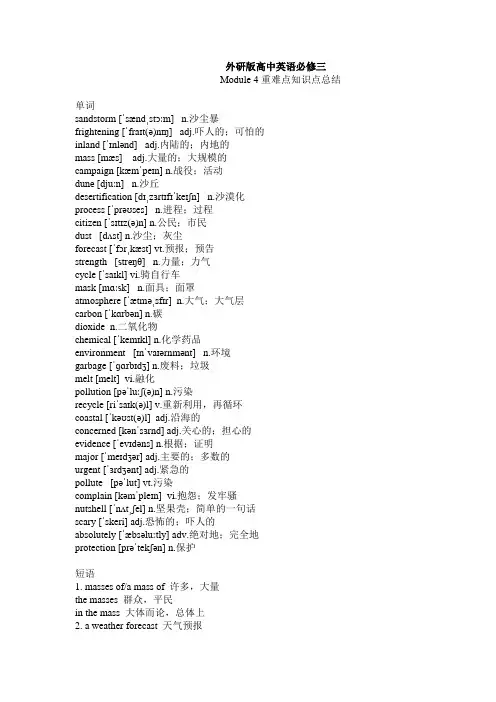
外研版高中英语必修三Module 4 重难点知识点总结单词sandstorm [ˈsændˌstɔːm] n.沙尘暴frightening [ˈfraɪt(ə)nɪŋ] adj.吓人的;可怕的inland [ˈɪnlənd] adj.内陆的;内地的mass [mæs] adj.大量的;大规模的campaign [kæmˈpeɪn] n.战役;活动dune [djuːn] n.沙丘desertification [dɪˌzɜrtɪfɪˈkeɪʃn] n.沙漠化process [ˈprəʊses] n.进程;过程citizen [ˈsɪtɪz(ə)n] n.公民;市民dust [dʌst] n.沙尘;灰尘forecast [ˈfɔrˌkæst] vt.预报;预告strength [streŋθ] n.力量;力气cycle [ˈsaɪkl] vi.骑自行车mask [mɑːsk] n.面具;面罩atmosphere [ˈætməˌsfɪr] n.大气;大气层carbon [ˈkɑrbən] n.碳dioxide n.二氧化物chemical [ˈkemɪkl] n.化学药品environment [ɪnˈvaɪərnmənt] n.环境garbage [ˈɡɑrbɪdʒ] n.废料;垃圾melt [melt] vi.融化pollution [pəˈluːʃ(ə)n] n.污染recycle [riˈsaɪk(ə)l] v.重新利用,再循环coastal [ˈkəʊst(ə)l] adj.沿海的concerned [kənˈsɜrnd] adj.关心的;担心的evidence [ˈevɪdəns] n.根据;证明major [ˈmeɪdʒər] adj.主要的;多数的urgent [ˈɜrdʒənt] adj.紧急的pollute [pəˈlut] vt.污染complain [kəmˈpleɪn] vi.抱怨;发牢骚nutshell [ˈnʌtˌʃel] n.坚果壳;简单的一句话scary [ˈskeri] adj.恐怖的;吓人的absolutely [ˈæbsəluːtly] adv.绝对地;完全地protection [prəˈtekʃən] n.保护短语1. masses of/a mass of 许多,大量the masses 群众,平民in the mass 大体而论,总体上2. a weather forecast 天气预报。
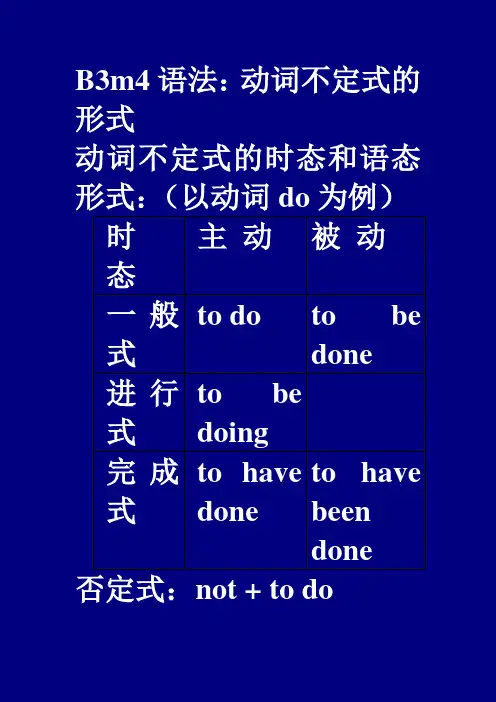
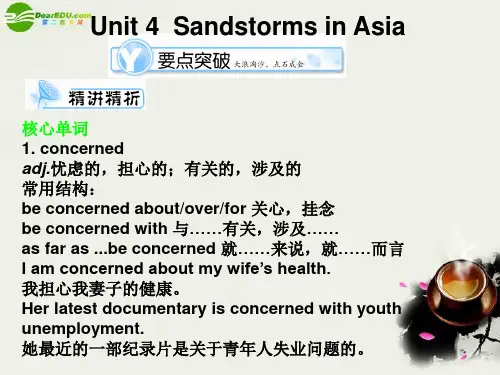
外研版高中英语必修三Module4SandstormsinAsia(答案)高中英语学习材料(灿若寒星*制作整理)Module 4 Sandstorms in AsiaSectionⅠIntroduction, Reading and Vocabulary &Function 点金测评·创新训练【基础巩固全面训练】Ⅰ.单词拼写1.encourages2.frightened3.signed4.campaign5.survived6.process7.forecast8.strength9.particular10.providedⅡ.短语翻译11. 砍倒,消减12. 掘起,挖出13. 建议某人做某事14. 遭遇<雨、雪等>15. 由于……的结果,因为16. 最好做某事17. 一个接一个地18. 向某人提供某物19. 冲走,扫除,摧毁20. 到……为止,截止到21. so that22. take in23. give out24. do nothing but do sth.25. can’t help but do sth.26. care about27. suggest a solution28. look through29. in a nutshell30. have some difficulty/trouble in doing sth.Ⅲ.单项选择31. A 考查名词辨析:environment环境;situation情景,形势,处境;case情况,实例;position位置,职位。
32. B 考查动词短语辨析:cut out删除,裁掉;cut down消减,缩短;cut off切断,隔绝;cut up切碎。
33.D 考查介词搭配:名词protection与介词from连用。
34.B 考查名词辨析:scene情景,场面;sign 符号,迹象,标志;sight视力,眼界;view 视野,风景;根据句意理解,则用sign符合题意。
Ⅰ.单词荟萃1. ___________ adj.吓人的,可怕的→ ________ adj. 害怕的→ ________ vt. 使害怕→fright n. 惊吓2. ________ n.力气,力量;长处→ ________ v. 加强→ strong adj. 强壮的3. ___________ n. 环境,围绕,外界→environmental adj.环境的;有关环境的4.pollute v.污染→ ________ adj.受污染的→ ________ n. 污染5.major adj.主要的,较大的→ ________ n.大多数6. ________ adj.关心的,担心的→concern n. 关心,担心7. _______ adj. 急迫的,紧急的→urgency n. 紧急;紧急的事8.complain v. 抱怨,投诉→ ___________ n. 抱怨,投诉9. __________ adv. 绝对地,完全地→absolute adj. 绝对的,完全的10.protection n. 保护→ ________ v. 保护,防护Ⅱ.短语检测1.受困于,遭遇2.砍倒3.作为……的结果;由于4.建议某人做某事5.阻止某人做某事6.接受;理解;吸收7.分发;发出;用完;耗尽8.忍不住做某事9.简言之;概括地讲10.改善环境be caught incut downas a result ofadvise sb. to doprevent/stop sb. (from) doing sth. take ingive outhelp but do/can’t but do nutshell/in shortimprove the environmentⅢ.佳句再现1.They are often ___________ you cannot see the sun, and the wind is sometimes _______________ move sand dunes.他们常常很浓,以至于连太阳都看不见,而且风力有时强到可以移动沙丘。
Ⅰ.单词荟萃1. ___________ adj.吓人的,可怕的→ ________ adj. 害怕的→ ________ vt. 使害怕→fright n. 惊吓2. ________ n.力气,力量;长处→ ________ v. 加强→ strong adj. 强壮的3. ___________ n. 环境,围绕,外界→environmental adj.环境的;有关环境的4.pollute v.污染→ ________ adj.受污染的→ ________ n. 污染5.major adj.主要的,较大的→ ________ n.大多数6. ________ adj.关心的,担心的→concern n. 关心,担心7. _______ adj. 急迫的,紧急的→urgency n. 紧急;紧急的事8.complain v. 抱怨,投诉→ ___________ n. 抱怨,投诉9. __________ adv. 绝对地,完全地→absolute adj. 绝对的,完全的10.protection n. 保护→ ________ v. 保护,防护Ⅱ.短语检测1.受困于,遭遇2.砍倒3.作为……的结果;由于4.建议某人做某事5.阻止某人做某事6.接受;理解;吸收7.分发;发出;用完;耗尽8.忍不住做某事9.简言之;概括地讲10.改善环境be caught incut downas a result ofadvise sb. to doprevent/stop sb. (from) doing sth. take ingive outhelp but do/can’t but do nutshell/in shortimprove the environmentⅢ.佳句再现1.They are often ___________ you cannot see the sun, and the wind is sometimes _______________ move sand dunes.他们常常很浓,以至于连太阳都看不见,而且风力有时强到可以移动沙丘。
2.Sandstorms in China appear _________________ in recent years as a result of “desertification”.由于“沙漠化”越发严重,中国近年来发生沙尘暴的次数明显增加了。
3.The storm sometimes continues all day and traffic moves very slowly because the thick dust ___________________. 沙尘暴有时会持续一天,车辆移动得很慢,因为厚厚的沙尘使道路难以看清。
4. ____________________________nearer, the government is planting trees. 为了防止沙漠离得更近,政府正在植树。
5.I can’t help but ______________. 我忍不住感到担心。
Ⅳ.词汇学习1strength n. [U]力量;力气[C, U]优点;长处(1) strong adj. 强壮的;坚强的;浓的strengthen vt. 加强,巩固(2) with all one’s strength 用上全身的力气【易混辨析】power, force, energy和strength(1)power指“动力,权力,能力”,用途最广;用于各种身心的、潜在的、外显的力,还可指电力。
如:The different types of infinitive; Expressions with but+ infinitivepower cut/failure 停电 in power 在执政be in/within/beyond one’s power (to do st h.) (没)有能力( 做某事)(2)force指“力,暴力,武力”,表示“力量”时,指人或物撞击时所用的力,其复数形式常指“兵力,军队”。
如:the force of the explosion爆炸力peacekeeping forces 维持和平部队(3)energy 依照其物理学定义讲是“能,能量”,另外还可指“精力,活力,干劲”。
如:nuclear energy核能 full of energy精力充沛devote all one’s energies to (doing) sth.全力以赴做某事(4)strength指“力气,力量,体力”,是在身体组织内存在的力量。
还可以指优点、长处。
如:build up one’s strengt h 增强体力one’s strengths and weaknesses 某人的长处和缺点【活学活用】(1)It is beyond my ______ to help you. 我没有能力帮助你。
(2)I don’t have the ______ to deal with it right now. 我现在没有精力处理这件事情。
(3)The soldiers took the prisoners away by _____. 士兵们强行把犯人带走了。
(4)He hasn’t got en ough _______ to remove that stone. 他没有足够的力气搬走那块石头。
2concerned adj. 关心的;担心的;与……有关的(1) concern n. 关心;忧虑v. 与……有关,涉及;使忧虑,使担心(2)be concerned about/for 担心……all people concerned 所有有关人员be concerned in与……有牵连as far as…is concerned 就……而言;依……看来【经典句式】be concerned that …担心……It concerns me that ………让我担心。
What concerns me is …让我担心的是……【活学活用】1. 根据汉语意思完成句子(1)He _________________ he won’t get his money back. 他担心要不回自己的钱。
(2)We ________________________ her safety. 我们都很担心她的安危。
(3) ____________________, the whole idea is crazy. 在我看来,整个想法都很荒唐。
2. 单项填空_______ is our lack of preparation for the change.A.It concerns me B.What concerns meC.I am concerned that D.I am concerned about【解析】 B语意:让我担心的是,我们对事态的发展缺乏准备。
B项为what引导的主语从句,与后面的系表结构形成完整的句子。
如果用A,后面要跟that引导的从句。
C项后面也是要用that引导的从句。
因为is后面是一个名词词组,因此若要用D 则要去掉is。
3complain v. 抱怨,发牢骚;投诉(1)complaint n.抱怨;诉苦;投诉;控告(2)complain that… 抱怨……complain about/of 抱怨……;诉说…… complain to sb. 向某人抱怨make a complaint 抱怨;投诉【活学活用】(1) You have nothing ______________, do you?你没什么可抱怨,不是吗?(2)The roadwork caused much _____ among local residents.道路工程引起周围居民很多怨言。
Ⅴ.短语学习1be/get caught in被困于,遭遇(1)catch up with sb.赶上,追上某人catch (sb.) up 赶上,追上(某人) catch sb. doing 撞见某人在做某事(2)catch hold of抓住 catch sight of突然看见(3)catch a train/bus 赶上火车/汽车 catch fire 着火catch one’s eye/attention 吸引某人的注意(not)catch what one says (没)听懂/听清某人的话【活学活用】(1)We ____________ a rainstorm on the way here.我们到这儿来的路上遇到了暴风雨。
(2)If you miss a lot of classes, it’s very difficult to ________.如果你落下了很多节课,要赶上是很难的。
(3) Drive faster—they’re _______________ us.开得再快点——他们要赶上我们了。
(4) He __________________ in the classroom. 他被撞见在教室里抽烟。
(5) Sorry, I ____________ what you said. 对不起,我没听清你的话。
2cut down削减(cut sth. down/cut down on sth.); 砍倒cut in (on sb.)插嘴;插入 cut up 切碎cut off切掉;切断……的供应;隔绝【活学活用】(1) He tried to ___________on smoking but failed. 他试图少抽烟,但没成功(2)The gas ______________. As a result, we had to eat out.煤气供应被切断了,因此我们不得不出去吃。
(3)It is impolite for children to _______when their seniors are talking.孩子们在他们的长辈谈话时插嘴是不礼貌的。
(4) In winter, the town ______________by snow.冬天,这个小镇经常因为大雪与外界隔绝。
3give out分发(= hand out);发布,公布(消息等);发出(光、声音等);用完,耗尽give away泄露;赠送;颁发 give back 归还;送回give in (to) 认输,投降,屈服;交上,呈上give off 发出(光、声音等);散发出(气味) give up放弃;停止;抛弃【情景记忆】【活学活用】根据语境用give的短语填空(1) He has _______ to my views.(2) If plasti c and rubber are burnt, they’ll ______ poisonous gases.(3) Don’t _________the secret.(4) After a month their food supplies _______.(5) The news of the President’s death ___________ in a radio broadcast.Ⅵ. 句型学习Sandstorms in China appear to have increased in recent years as a result of “desertification”.由于“荒漠化”越发严重,中国近年来发生沙尘暴的次数明显增加了。